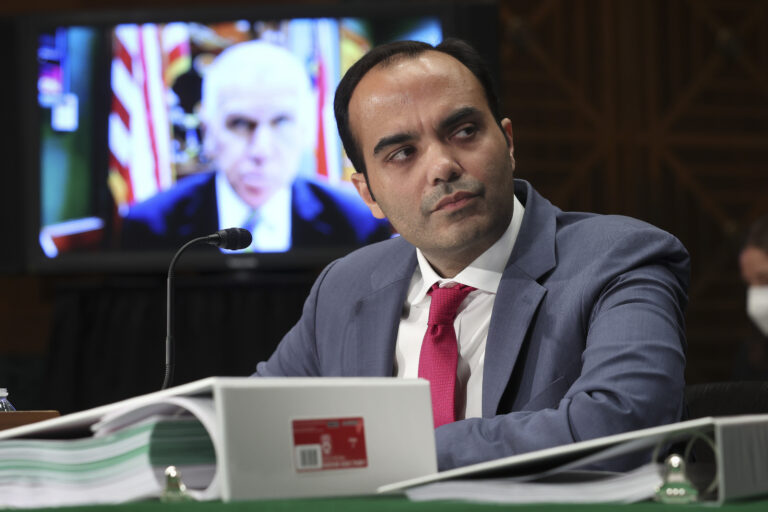From online banking to e-commerce, advances in technology have given consumers in the digital age new products and services. But the rise of the digital economy has been accompanied by the emergence of digital robber barons. Just as social media companies entrenched their dominance by making it hard for users to port their own content and connections to rival platforms, big banks restricted users’ access to their own financial data to cement their monopoly power.
Data portability is the idea that users should be free to move their data to rival platforms. Before number portability was mandated by Congress in the 1996 Telecom Act and implemented by the FCC in 2003, cellphone customers faced high switching costs—imagine the hassle of informing your friends and family of your number—which limited churn and kept cellphone prices artificially inflated. Now big banks are up to the same tricks: To curb competition from newer and smaller companies, large financial institutions have restricted consumers’ data portability, by for example, making acts as basic as sharing personal financial data or transferring their own funds with a new institution a hassle.
Fortunately, the Consumer Financial Protection Bureau (CFPB) is initiating rulemaking that would facilitate enhanced consumer access to their financial data. Through a provision of the Dodd-Frank Act known as Section 1033, the agency can help take big banks to task and give emerging financial service providers a fair shot to compete.
Like other corporate giants that have faced regulatory scrutiny, big banks aren’t going down without a fight. Bank Policy Institute (BPI), a lobbying group whose membership includes Wells Fargo and JPMorgan Chase, argued in a recent comment letter that strong Section 1033 rulemaking would fuel the rise of Big Tech in the financial industry. BPI’s angle is obvious here: CFPB director Rohit Chopra is a noted supporter of regulating Big Tech, and has scrutinized the tech giants’ encroachment into the payments sector while in office.
But BPI’s spin conveniently ignores that Big Tech has been pushing into the financial services industry largely in collaboration with—and not to compete against—big financial institutions. From Goldman Sachs’ partnership with the Apple Card to TikTok’s recently exposed collaboration with JPMorgan Chase, the giants of the financial and tech industries have a vested interest in shoring up their respective monopoly positions. That BPI member JPMorgan Chase is so eager to collaborate with TikTok, a Chinese-based company drawing increasingly intense bipartisan scrutiny and even calls for its ban in the United States, is just the latest and most galling example of these developments.
Contrary to the bank lobby’s self-serving narrative, strong Section 1033 rulemaking stands to foster innovation by giving emerging companies a fair shot to compete against entrenched incumbents in both industries. Indeed, Section 1033 rulemaking will help level the playing field by giving small players and new entrants the same right to access data that Big Tech can already get its hands on quite easily.
This reality explains why consumer and competition advocates have long argued that strong Section 1033 rulemaking will help encourage competition in the financial services industry. In a 2021 comment before the CFPB, a coalition of consumer organizations led by the National Consumer Law Center argued that “Improved access to consumer-authorized data can benefit competition, which will benefit consumers.” Monopoly power comes at a grave expense to innovation, and at a time when consumers are increasingly interested in alternative relationships, this rulemaking will be a boon to the broader economy and consumer choice.
In the absence of strong Section 1033 rulemaking, access to financial services data risks being decided primarily through backroom dealmaking. It goes without saying that these informal arrangements stand to benefit mega-corporations like Google or Apple, not small players. After all, Google executives will never have a problem getting a meeting with Jamie Dimon, nor will TikTok leadership or the likes of Elon Musk. But emerging players and innovative startups are unlikely to have such opportunities, meaning that a lack of rulemaking will only entrench Big Banks’ gatekeeper status.
It would be a mistake to dismiss these concerns as merely hypothetical. As one recent example, big banks like Chase are fearful that direct account-to-account payment options will cut into their ability to profit off credit card transactions. In response, Chase is using its dominant position to steer consumers away from paying vendors directly from their own bank account. Without strong regulatory intervention, mega-corporations in tech and finance will continue to inhibit the growth of promising new ventures.
Shortly after becoming CFPB director, Chopra noted that “Big Tech companies are eagerly expanding their empires to gain greater control and insight into our spending habits.” He is correct. With the agency finally initiating rulemaking on Section 1033 more than a decade after Dodd-Frank passed into law, Chopra must reject the bank lobby’s bad faith efforts to water down the rules. The CFPB should empower consumers to fully control their personal financial data in the interest of cultivating a fair and truly competitive financial services industry.
Morgan Harper is Director of Policy and Advocacy at the American Economic Liberties Project.
